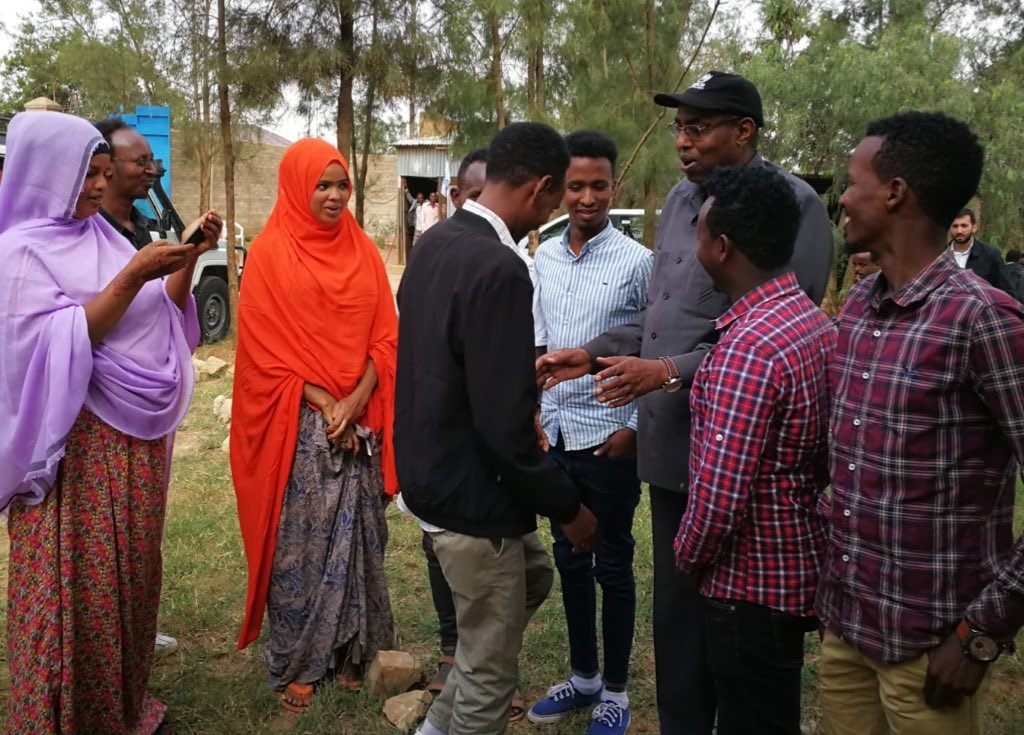UNHCR Special Envoy for the Somali refugee situation applauds Ethiopia's generosity to refugees
UNHCR Special Envoy for the Somali refugee situation applauds Ethiopia's generosity to refugees

ADDIS ABABA, Ethiopia - UNHCR Special Envoy for the Somali refugee situation, Ambassador Mohamed Affey, expressed his deepest appreciation to the Government of Ethiopia for their continued generosity in providing access to its territory to refugees fleeing in neighbouring regions and for their efforts towards finding lasting solutions.
The Special Envoy noted with concern that the Somali refugee situation has displaced millions for over two decades, affecting three generations. Approximately 2.1 million Somalis are displaced within Somalia and nearly one million are refugees in the surrounding region.
He added that Ethiopia has been hosting over 920,000 refugees, with over 255,000 of them coming from Somalia.
“The Ethiopia refugee operation is characterized by both protracted and very complex emergency situations," said the Ambassador, during his recent visit to the country. He added that Ethiopia continues to receive new arrivals from South Sudan, Eritrea and Somalia.
He visited Ethiopia on a week-long trip where he met with Government officials, UN partners and NGOs and representatives from the private sector, refugee leaders and host community representatives.
He commended the progress made by Ethiopia in the implementation of the CRRF under the auspices of the Nairobi Declaration for finding durable solutions for Somali refugees.
“UNHCR is delighted by the unprecedented regional effort that commits to provide collective protection, assistance to Somali refugees and contributions towards realisation of durable solutions,” he said.
Ambassador Affey applauded the efforts of IGAD member states that have translated the commitments made at the global level in the New York Declaration into action at the regional level, through the Special Summit on Somali refugees held last year in March.
He outlined that CRRF is the vehicle for the implementation of the nine pledges made at the Leaders’ Summit around thematic areas such as out of camp policy, education, work and livelihoods opportunities, documentation, other social and basic services and local integration.
“It was difficult to distinguish a refugee from a host community member.”
During his visits to Dollo Addo, Melkadida and Jijiga camps, Ambassador Affey noted the importance of education, agricultural farming and health advocacy for the refugees and their hosting communities.
“It was difficult to distinguish a refugee from a host community member,” he said. “I was amazed by the diverse livelihood activities available to both communities who are living as one, increasing their self-reliance and developing the region.”

He commended the CRRF model and its application whereby refugees and locals share farms, markets, training centres and schools with support from UNHCR and its partners.
During his visit, he presided over the inauguration of the Teachers Training College in Dollo Ado and visited a market space in Bokolmanyo and the Kobe and Buramino irrigation schemes.
UNHCR’s operations in Dollo Ado and Melkadida are innovation-led with projects that promote community-based protection, education, quality teaching, participation, self-reliance and livelihoods among refugees and local communities.
“I would like to express my gratitude to the Government of Ethiopia for allocating 1,000 hectares of arable land on an equal sharing basis with refugees and their host communities,” said the Special Envoy who also thanked the IKEA Foundation for supporting livelihood projects that benefit both refugees and local communities, particularly in education and the Buramino irrigation scheme.
“I would like to express my gratitude to the Government of Ethiopia for allocating 1,000 hectares of arable land ...to refugees and their host communities.”
He noted the invaluable role that donors and partners play in supporting the host countries’ efforts towards finding durable solutions to end the plight of Somali refugees in the IGAD region, which comprises the countries of Djibouti, Eritrea, Ethiopia, Kenya, Somalia, South Sudan, Sudan and Uganda.
In the spirit of inclusivity and the “whole of society” approach, the Special Envoy had constructive dialogue with representatives from the local community and Somali refugee leaders. He engaged with them on their understanding of CRRF, their needs, challenges and opportunities.
He also emphasized the need for the international community to continue demonstrating positive solidarity and responsibility sharing by availing resettlement opportunities to refugees, strengthening refugee management co-operation through the implementation of a strong humanitarian and development approach, focusing on youth empowerment, and job creation.
“It is critical for all commitments related to providing asylum and maximising opportunities for durable solutions to be adequately implemented and sustainably funded,” he said. He added that the Nairobi Comprehensive Regional Plan of Action on finding durable solutions, for the more than two million displaced Somalis, is a unique opportunity for IGAD Member States, with the support of the international community, to meet these commitments.









